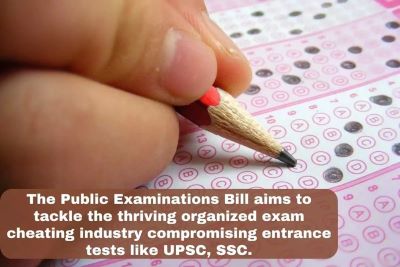Context
The Public Examinations (Prevention of Unfair Means) Bill, 2024, was recently introduced in the Lok Sabha with the aim of addressing the rampant issue of unfair practices in public examinations across India. The bill seeks to establish stringent measures to prevent activities that compromise the integrity and credibility of such exams. By defining and penalizing various forms of unfair means, the legislation aims to bring about greater transparency, fairness, and trustworthiness in the examination system. This comprehensive bill encompasses a wide range of examinations conducted by designated public examination authorities and extends its purview to cover various Ministries and Departments of the Central Government involved in recruitment processes.
Understanding Unfair Means in Examinations
The term "unfair means" in the context of examinations encompasses a multitude of actions aimed at gaining an unfair advantage in the assessment process. Section 3 of the bill enumerates over 15 such acts, including the leakage of question papers or answer keys, unauthorized access to examination materials, tampering with answer sheets, and providing solutions to candidates during exams. These actions, often carried out for monetary or wrongful gain, undermine the integrity of the examination process and compromise the merit-based selection of candidates. Additionally, the bill addresses activities such as tampering with documents related to candidate short-listing or final merit ranking, creating fake websites, and conducting fraudulent examinations.
Scope of Public Examinations
The bill defines "public examinations" as those conducted by specified public examination authorities listed in its schedule, such as the Union Public Service Commission (UPSC), Staff Selection Commission (SSC), Railway Recruitment Boards (RRBs), Institute of Banking Personnel Selection (IBPS), and National Testing Agency (NTA). These authorities oversee a diverse array of examinations, ranging from civil services and defense recruitment to banking and university entrance tests. Furthermore, the legislation extends its coverage to include all Ministries and Departments of the Central Government involved in staff recruitment processes, thereby ensuring a comprehensive framework to address unfair practices across various sectors.
Penalties for Violations
The proposed law outlines stringent penalties for individuals or entities found guilty of resorting to unfair means in public examinations. Section 9 stipulates that offenses under the bill are cognizable, non-bailable, and non-compoundable, indicating the severity of the consequences for violators. Offenders may face imprisonment ranging from three to five years and fines of up to Rs 10 lakh. In cases where the fine is not paid, additional imprisonment may be imposed as per the provisions of the Bharatiya Nyaya Sanhita, 2023. Moreover, service providers engaged in supporting examination conduct may be fined up to Rs 1 crore, along with other penalties, for their involvement in facilitating unfair practices.
Combatting Organized Paper Leaks
The bill includes provisions for harsher punishment in cases of organized paper leaks, defined as unlawful activities undertaken by groups conspiring to gain wrongful advantages in public examinations. Section 11 outlines penalties for organized crime, including imprisonment for a minimum of five years, extendable to ten years, along with fines starting from one crore rupees. By targeting organized efforts to subvert the examination system, the legislation aims to deter and effectively prosecute those involved in orchestrating large-scale cheating and fraud.
Rationale for the Bill
The introduction of the Public Examinations (Prevention of Unfair Means) Bill, 2024, underscores the urgent need to address the pervasive issue of examination malpractices that have plagued recruitment processes across India. Over the past few years, numerous instances of question paper leaks have disrupted examination procedures, affecting millions of aspirants seeking government jobs. The bill's Statement of Objects and Reasons highlights the detrimental impact of malpractices on examination integrity, leading to delays, cancellations, and distrust among stakeholders. By establishing a comprehensive legal framework, the legislation aims to instill confidence among youth in the fairness and credibility of the examination system, ensuring that merit-based selection processes remain uncompromised.
Conclusion
The Public Examinations (Prevention of Unfair Means) Bill, 2024, represents a significant step towards addressing the pervasive issue of unfair practices in public examinations in India. By defining and penalizing various forms of misconduct, the legislation seeks to uphold the integrity and credibility of the examination system, thereby safeguarding the interests of millions of aspirants. Through stringent penalties for violators, including organized crime groups, the bill aims to deter and prosecute those attempting to subvert the examination process for personal gain. Ultimately, the enactment of this bill is crucial for restoring trust and confidence in the examination system, ensuring that meritocracy remains the cornerstone of recruitment processes across various sectors.
|
Probable Questions for UPSC Mains Exam
|
Source – The Indian Express









